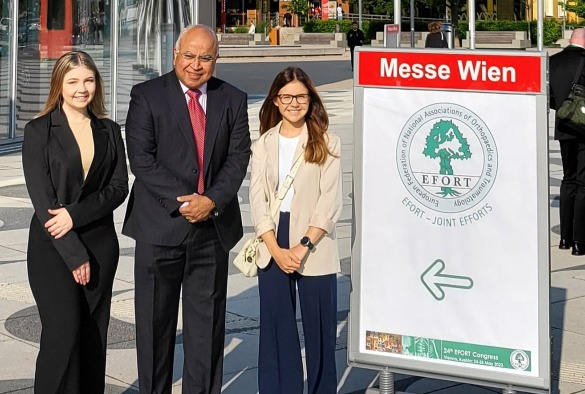Both Alice Fortune (5th year medical student, far right in picture above) and Jessica LaCourse’s (4th year medical student, far left in picture) work investigates non-invasive interventions for musculoskeletal foot conditions, specifically the use of foot orthotics, i.e. shoe inserts.
Jessica has been studying the use of orthotics with and without a metatarsal pad, placed under the ball of the foot, to reduce pain and fear of falling in older adults. Meanwhile, Alice has been exploring the use of prefabricated orthotics as a way of reducing incidence of running-related injuries and improving comfort and speed during running.
Alice’s research motivation
Running is a highly popular sport but the incidence of running-related injuries is also high, particularly for amateur and recreational runners. Foot discomfort during running is also a prevalent issue. These issues may lead to people stopping running, or from taking it up in the first place. Running has huge benefits for both mental and physical health and so finding ways to encourage individuals to run is important.
I recently published a paper on research into this area where we explored whether prefabricated orthotics influence the incidence of running-related injuries, perceived comfort while running and running speed. I am extremely grateful to Mr George Ampat, Consultant Orthopaedic Surgeon and my Research and Scholarship supervisor for giving me this opportunity as well as supporting me to complete and publish this research. Our study was based in the UK and included over 100 participants who were used to running distances of 5kms or more recreationally. We found that orthotics significantly improved comfort and also led to reductions in running-related injury rates and enhancements in speed, compared to individuals who ran without an orthotic. I was grateful for the opportunity to share these findings at the European Federation of National Associations of Orthopaedics and Traumatology (EFORT) Congress 2023 in Vienna. Being involved in research that will support and encourage people to live an active lifestyle has brought me pride as exercise is something that is crucial for our health and well-being and a key factor in the prevention of many diseases.
Alice’s plans for the future
This work reflects my love for lifestyle medicine and I am enthusiastic to do further research into this subject in the future. I will be graduating from medicine this summer and beginning my place on the North West Specialised Foundation Programme. During this, I am lucky to have a 4-month block of protected research time where I hope to study this field further.
Jessica’s research motivation
Foot pain affects many older adults through various means and is often accepted as a part of ageing. However, this is not the case, and prefabricated orthotics have been shown to be a non-invasive, low-cost option in managing foot pain. For older adults, foot pain often results in avoidance of activities, ultimately resulting in weakness, increased weight, and frailty. These factors can result in reduced confidence in movement and therefore a fear of falling, which in fact increases the likelihood of actual falls. Falls cost the NHS billions of pounds every year to manage and can have devastating effects on patients and their families. Therefore, developing a management option that decreases pain, improves function, and improves the fear of falling, would be a suitable preventative lifestyle measure.
A metatarsal pad can be built into prefabricated orthotics to improve people’s own sense of their physicality (known as proprioception) and potentially improve confidence in movement. My recent study identified that patients using the combined prefabricated orthotic with metatarsal pad, as well as patients using the orthotic alone, had significant improvements in not only their foot pain, but back pain, hip pain, knee pain, and ankle pain too! They also reported significant improvements in foot function and fear of falling. There was no significant difference between the two groups, but the group using combined measures did show greater improvements. This is nonetheless reassuring for patients who may find the metatarsal pads uncomfortable and prefer to use the orthotics alone.
Jessica’s plans for the future
Having presented this work at the European Federation of National Associations of Orthopaedics and Traumatology (EFORT) in Vienna, I am keen to continue developing my research and presentation skills. It was an honour to be invited to present my work on an international scale, alongside Alice and our supervisor, Mr George Ampat. I am very grateful to Mr Ampat for all of his help to date, and I plan to continue to work in orthopaedic research, with my elective planned in orthopaedic oncology and paediatric orthopaedics!
We acknowledge the support from Aetrex Inc in providing the Orthotics to conduct the research.
